PREVIOUS
Women’s Reservation Bill 2023 – Part 1
October 7 , 2023
564 days
7110
0
(இதன் தமிழ் வடிவத்திற்கு இங்கே சொடுக்கவும்)
Women’s Reservation Bill
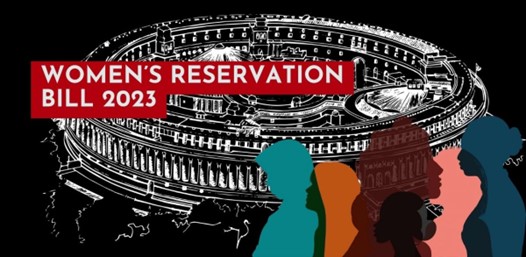
- Even 75 years after the independence, Parliament lacks substantial women representation from half the population.
- It is just 14% of seats held by women.
- The Share of women parliamentarians has never exceeded 15% in the past general elections.
- It is highlighting the importance of passing the “Women’s Reservation Bill” to harness women’s key role in nation building.
- Recently, the Lok Sabha (LS) and Rajya Sabha (RS), both passed Women's Reservation Bill 2023 (128th Constitutional Amendment Bill) or Nari Shakti Vandan Adhiniyam.
- Thus, it is becoming the first Bill to be passed in the new Parliament building.
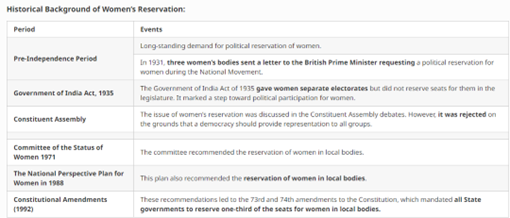
- According to a government source, the Bill does not require ratification by the states.
- Since it doesn’t change the actual number of seats that the states have in Parliament.
- So, the state representation in Parliament remains unaffected.
- It was introduced in Lok Sabha on 19 September 2023 during the special session of Parliament.
- The bill was introduced by the Union Minister of Law and Justice Arjun Ram Meghwal in Lok Sabha.
- On 20 September 2023, the Lok Sabha passed the bill with 454 votes in favour and two against.
- The Rajya Sabha passed the bill unanimously with 214 votes in favour and none against, on 21 September 2023.
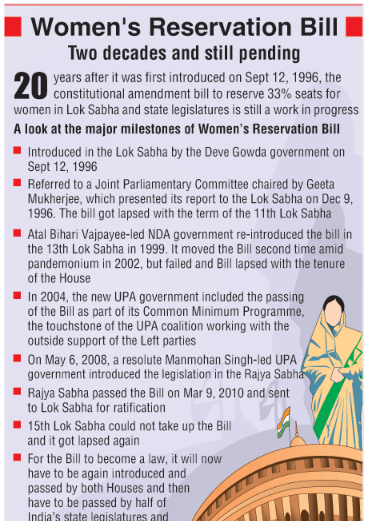
- No Member of Parliament abstained during the voting conducted by the Vice President Jagdeep Dhankhar which saw 100% votes in favour.
- President Droupadi Murmu signed the bill on 29 September 2023, and the gazette notification was also published the same day.
- Now it will be known as the Constitution (106th Amendment) Act, 2023.
- It made it clear that the reservation will come into force soon after the first delimitation (frozen until 2026).
- The bill reserves one-third of the seats in Lok Sabha, State legislative assemblies and the Delhi assembly.

- This will also apply to the seats reserved for SCs (Scheduled Castes) and STs (Scheduled Tribes) in Lok Sabha and State Legislatures.
- It was historic as being the first bill considered in the newly inaugurated parliament building.
- The women’s reservation would be implemented following the first delimitation, which is currently on hold until 2026.
- Delimitation is the readjustment of territorial limits of the Lok Sabha and Assembly constituencies, as well as the number of seats in the Assembly and the Lok Sabha in each State.
- It is a periodical exercise done based on the figures available in the latest Census.
- The last delimitation order of the Delimitation Commission was issued in 2008, fixing the boundaries of all constituencies.
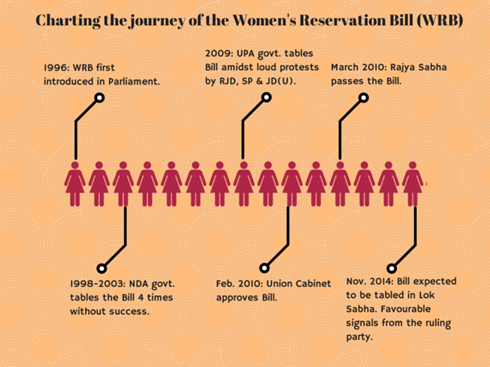
- However, there is currently a freeze on the readjustment of the number of seats in the State Assemblies and the Lok Sabha.
- In 2002, Article 82 was amended by the 84th Amendment Act.
- It shall not be necessary to readjust the allocation of Lok Sabha constituencies State-wise and the division of each State into constituencies until the figures of the first Census held after 2026 were available.
Provisions for Women’s Political Empowerment in Indian Constitution
- Article 15 (3): The State is empowered to make “special provisions”, legislative or otherwise, to secure women’s socio-political advancement.
- Article 325: Guarantees equal rights for both sexes, and entitles women to enjoy economic, social, cultural, and political rights on an equal footing with men.
Objectives of the Bill
- The proposed bill calls for the reservation of one-third (33.33%) of the total seats in the Lok Sabha and state legislative assemblies for women.
- It mandates 33 percent reservation for women in the Lok Sabha, the state Legislative Assemblies, and the Delhi Assembly.
- It also reserves one-third of seats for women within the existing SC and ST reservations.
- Seats will be reserved on a rotational basis, and reservations will cease after 15 years (sunset clause).
Background
- The discussion upon the reservation of women reservation bill is prevalent since the tenure of Former Prime Minister Atal Bihari Vajpayee in 1996.
- As the then Government lacked a majority, the Bill could not have been approved.
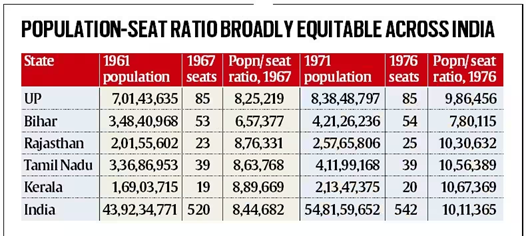
Earlier Attempts at Reserving Seats for Women
- The issue of reservation for women in politics can be traced back to the Indian national movement.
- In 1931, the three women’s bodies, leaders Begum Shah Nawaz and Sarojini Naidu jointly issued the official memorandum on the status of women in the new Constitution to the British Prime Minister.
- The National Perspective Plan for Women had recommended in 1988 that reservation be provided to women right from the level of the panchayat to that of Parliament
- These recommendations paved the way for the historic enactment of the 73rd and 74th amendments to the Constitution.
- It mandates all State governments to reserve one-third of the seats for women in Panchayati Raj Institutions and one-third of the offices of the chairperson at all levels of the Panchayati Raj Institutions, and in urban local bodies, respectively.
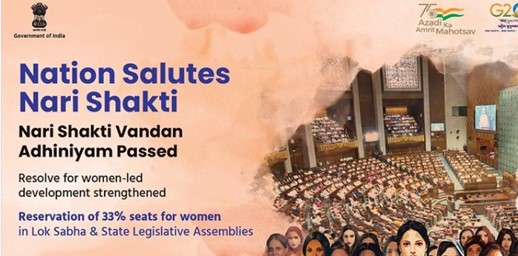
- Within these seats, one-third is reserved for Scheduled Caste/Scheduled Tribe women.
- Few recommendations made by the 1996 Geeta Mukherjee Committee were included in this version of the Bill.
- It recommended that reservation be provided for women of Other Backward Classes (OBCs) once the Constitution was amended to allow for reservation for OBCs.
- It also recommended that reservation be extended to the Rajya Sabha and the Legislative Councils.
- However, neither of these recommendations has been incorporated in the Bill.
- 1996 – The WRB was 1st introduced in 1996, and was referred to a Joint Parliamentary Committee.
- However, the Bill lapsed with the dissolution of the Lok Sabha and had to be reintroduced.
- 1998 – The Bill was reintroduced and yet again, it failed to get support and lapsed.
- 1999 – The Bill was reintroduced by the NDA government in the 13th Lok Sabha.
- The National Policy for the Empowerment of Women (2001) had stated that reservation will be considered in higher legislative bodies.
- And it was subsequently introduced twice in the year 2003.
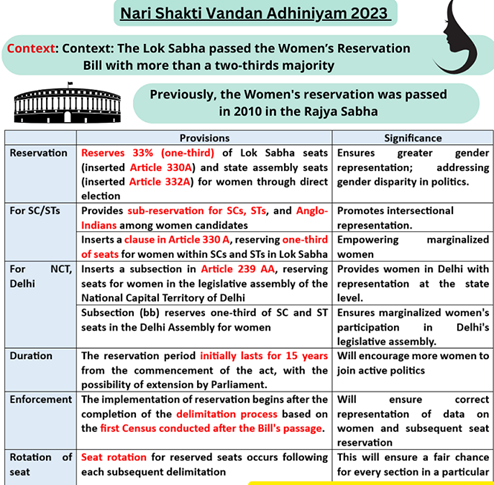
- 2004 – The UPA government included it in its Common Minimum Programme and finally tabled it in 2008.
- This time it was tabled in Rajya Sabha in 2008 as 108th Constitutional Amendment bill to prevent it from lapsing in Lok Sabha.
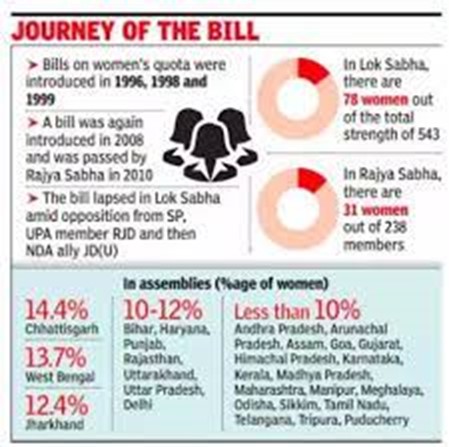
- In March 9th 2010, the Bill was passed in the Rajya Sabha but was not introduced in the Lok Sabha.
- The Congress-led UPA did not bring the Bill in the Lok Sabha for the lack of consensus and inadequate numbers to push it through
- Since then, the demand for reservation for women in legislative bodies is not new.
- In May 2013, the Ministry of Women and Child Development constituted a committee on the status of women.
- It recommended ensuring at least 50% reservation of seats for women in the Local bodies, State Legislative Assemblies, Parliament, Ministerial levels and all decision‐making bodies of the government
- In 2015, the Report on the Status of Women in India noted that the representation of women in state assemblies and Parliament continues to be dismal.
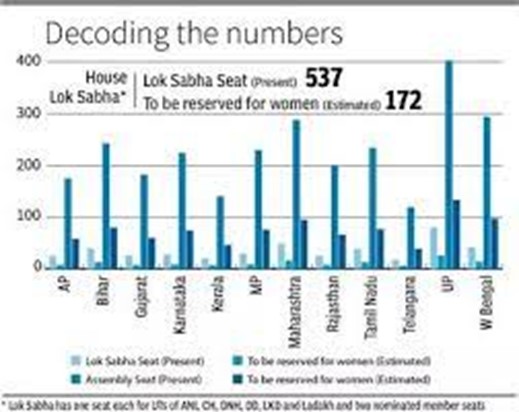
- It also recommended reserving at least 50% seats for women in local bodies, state legislative assemblies, Parliament, ministerial levels, and all decision-making bodies of the government.
Need
- There are 82 women Member of Parliaments in LS (15.2%) and 31 women in RS (13%) as of now in 2023.
- While the number has increased significantly since the 1st Lok Sabha (5%) it is still far lower than in many countries.
- Currently, the proportion of women MLAs in every State in the country is less than 16 per cent.
- Among the larger States, West Bengal fares better than others, with 14 per cent of its MLA population being female.
- The proportion is less than 10 per cent in 17 States, including Karnataka, Telangana and Tamil Nadu.
- In the 2023 election, Nagaland got its first two women MLAs.
- Mizoram has no women MLAs now.
- Mizoram too has not had a women MLA in the past seven Assemblies.
- Mizoram is the state where women outnumber men in the voters’ list.
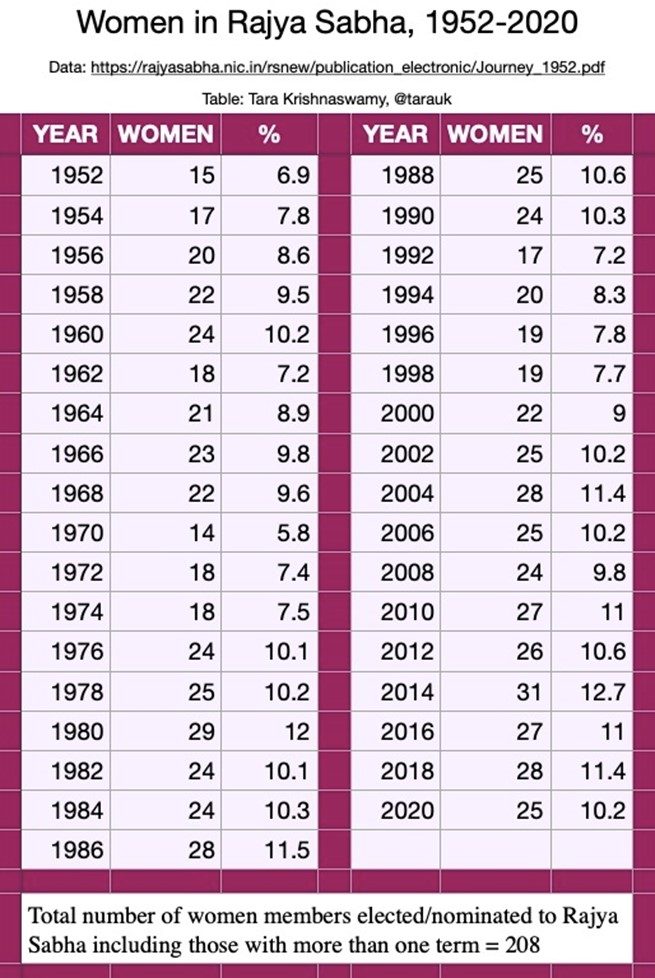
- According to recent UN Women data, Rwanda (61%), Cuba (53%), Nicaragua (52%) are the top three countries in women representation.
- Bangladesh (21%) and Pakistan (20%) as well are ahead of India in case of female representation.
- Based on data provided by the Inter-Parliamentary Union, India’s ranking in women’s representation stands at 148th out of a total of 193 countries.
- This ranking is in comparison to the global average of 26.5 percent.
- When compared with BRICS nations, including the new members, India has the second-lowest share (15%), just above Iran (6%).
- Over time, South Africa and Ethiopia have made giant strides in women representation in their national legislatures.
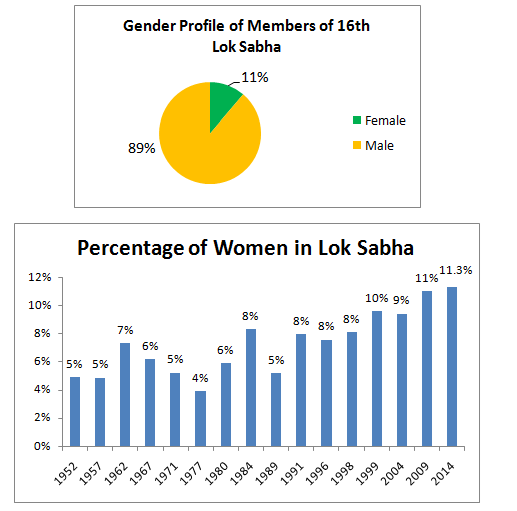
The Key Features
Reservation for Women in Lower House
- The Bill provided for inserting Article 330A to the constitution, which borrows from the provisions of Article 330.
- It provides for reservation of seats to SCs/STs in the Lok Sabha.
- The Bill provided that reserved seats for women may be allotted by rotation to different constituencies in states or Union Territories.
- In the seats reserved for SCs/STs, the Bill sought to provide one-third of the seats for women on rotational basis.

-
Reservation for Women in State Legislative Assemblies
- The Bill introduces Article 332A.
- It mandates the reservation of seats for women in every state Legislative Assembly.
- Additionally, one-third of the seats reserved for SCs and STs must be allocated for women.
- And one-third of the total seats filled through direct elections to the Legislative Assemblies shall also be reserved for women.
-
Reservation for Women in NCT of Delhi (New clause in 239AA)
- Article 239AA to the constitution grants special status to the Union Territory of Delhi as national capital with regards to its administrative and legislative functioning.
- Article 239AA (2)(b) was amended by the bill accordingly.
- It is to add that the laws framed by parliament shall apply to the National Capital territory of Delhi.
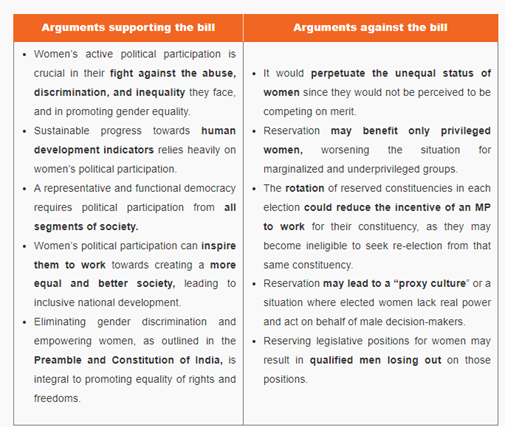
Commencement of Reservation (New article - 334A)
- The reservation will be effective after the census conducted after the commencement of this Bill has been published.
- Based on the census, delimitation will be undertaken to reserve seats for women.
- The reservation will be provided for a period of 15 years.
- However, it shall continue till such date as determined by a law made by Parliament.
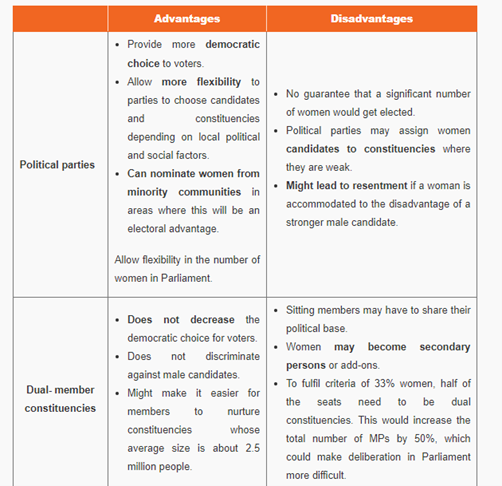
Leave a Reply
Your Comment is awaiting moderation.


